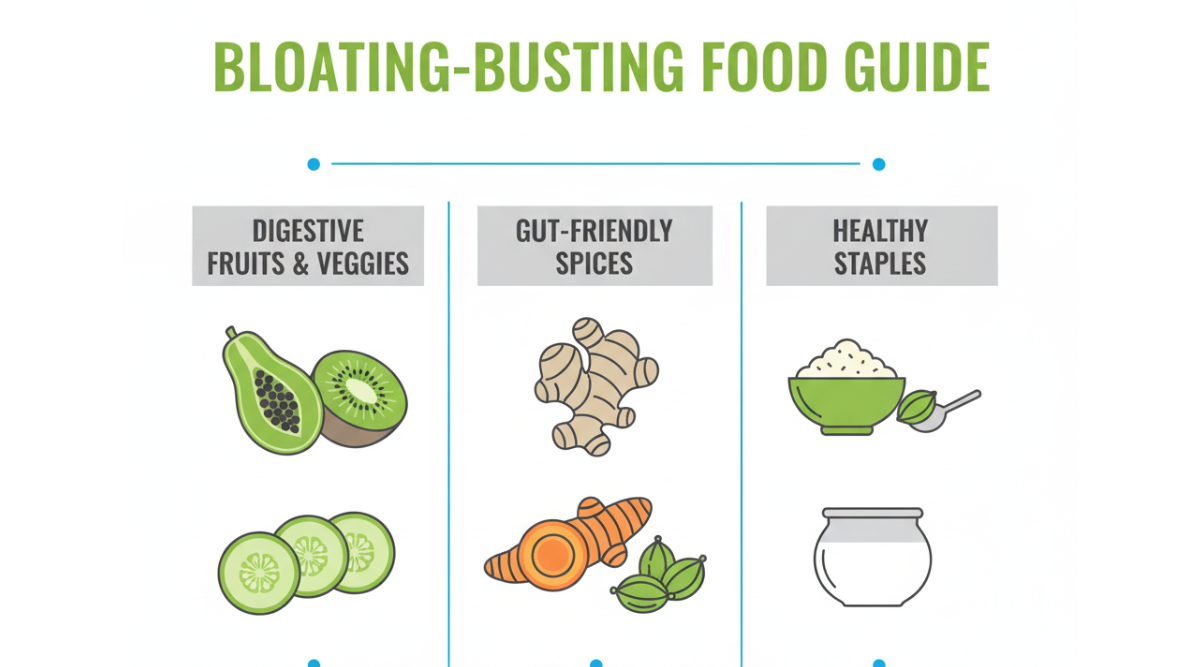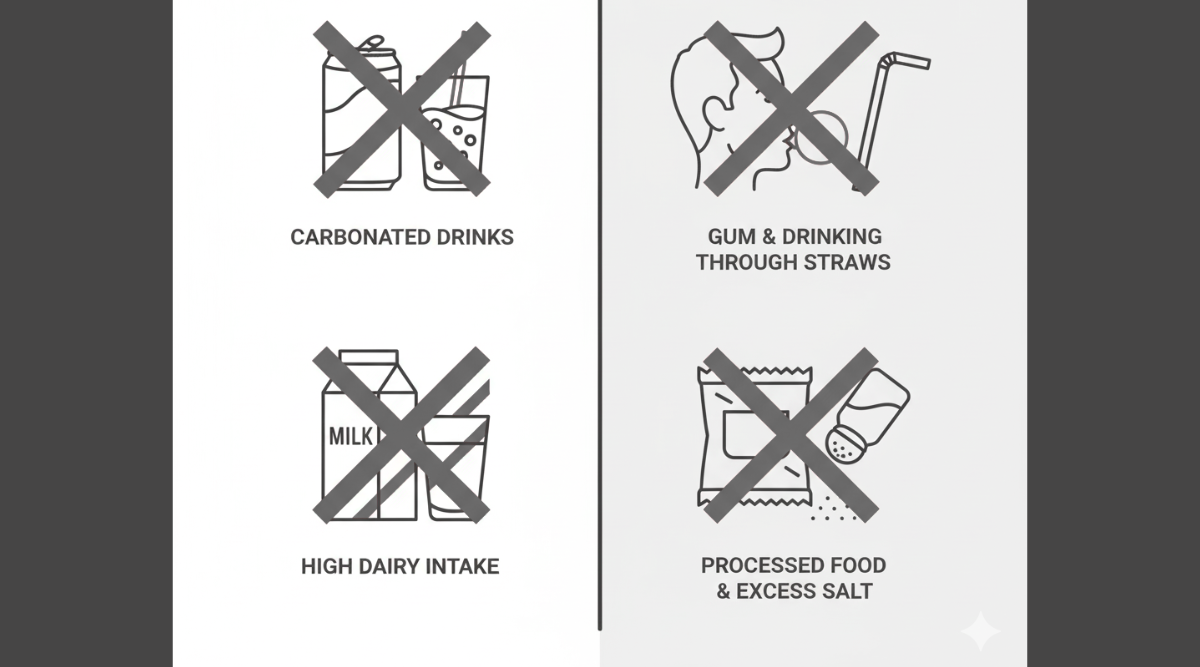Bloating can ruin a good meal, slow down an otherwise bright day, and disrupt comfort at home. Many people want real, simple ways to cut down on stomach bloating with natural remedies and a diet that works for them. This guide brings together proven advice - drawn from both medical guidance and Indian home wisdom - for anyone looking to reduce bloating naturally, feel lighter, and keep their digestive system on track.
Quick-Relief Remedies for Bloating
These practical steps offer relief for mild to moderate bloating. Take action early for the best results, and always listen to what your body tells you.
Herbal Teas That Relieve Bloating
Herbal teas have long been trusted for settling the stomach. Peppermint tea helps relax the gut muscles and can ease trapped air. Fennel—chewed as seeds or brewed as tea—is a traditional Indian remedy for gas. Chamomile and ginger teas are useful too, since they calm both the digestive tract and mind. Many families end meals with a cup of ajwain (carom seed) tea or a warm glass of ginger water.
Gentle Abdominal Massage and Gas Relief
Massaging the stomach in a clockwise direction helps move gas through the colon. Knee-to-chest stretches and light walking after meals speed up digestion, helping the system clear out trapped air quickly.
Indian Home Treatments for Quick Relief
A pinch of hing (asafoetida) dissolved in warm water is a popular home solution. Roasted cumin mixed with black salt and a dash of lemon juice also offers fast comfort after a rich meal. A glass of homemade buttermilk, seasoned with roasted cumin and black pepper, supports digestion and reduces bloating.
Light Exercise to Ease Bloating
Gentle stretching, short walks, and a few rounds of deep belly breathing are effective for quick relief. Even a leisurely stroll helps push gas through the intestines. Yoga poses like “pawanmuktasana” (wind-relieving posture) are worth trying—just a few minutes can help.
Knowing When to Seek Medical Help
If bloating comes with sharp pain, rapid weight loss, blood in stool, or ongoing discomfort that won't go away, it’s time to consult a doctor. Professionals at Dr. Morepen Home can provide trusted advice and care, right at your doorstep.
Foods That Reduce or Prevent Bloating
Shifting food choices can make a real difference. Gentle, gut-friendly foods improve digestion without discomfort.

High-Fiber Fruits and Vegetables
Papaya, pineapple, kiwi, and apples contain enzymes that support digestion. Spinach, carrots, and zucchini bring needed fiber. Start slow with fiber - increase it gradually so the gut can adjust, and drink plenty of water to keep things moving.
Water-Rich Foods and Diuretic Choices
Cucumbers, tomatoes, celery, and watermelon offer hydration and flush out extra salt. Asparagus is another great choice, as it helps the body eliminate excess fluid naturally.
Probiotic-Rich Foods for Gut Health
Yogurt, homemade curd, and fermented foods (like dosa, idli, or pickles) bring healthy bacteria to the gut. These beneficial microbes help balance digestion, reduce gas, and keep the stomach happy.
Herbs and Spices That Soothe
Turmeric, ginger, cardamom, and fennel seeds have been used for centuries to relieve digestive issues in Indian households. Sprinkle turmeric into your daily meals or chew on fennel seeds after eating for fresher breath and a calmer gut.
Smart Carbohydrates & Whole Grains
Oats, brown rice, and millets supply the body with energy and keep digestion steady. Highly processed grains and white bread often spark bloating, especially for those with a sensitive stomach.
Foods and Habits to Avoid
Some foods and practices increase bloating. Try to avoid or limit them for better comfort every day.
High-FODMAP Foods
FODMAPs are certain carbohydrates that cause gas in some people. Onions, garlic, beans, lentils, cauliflower, and cabbage can lead to discomfort. If you notice these trigger bloating, try reducing them and keep track of your symptoms.
Artificial Sweeteners and Carbonated Drinks
Sodas, sparkling water, and sugar-free sweets often contain compounds that ferment in the gut, causing extra gas. Pick water or herbal teas as refreshments instead.
Actions That Swallow Air
Chewing gum, drinking through a straw, and smoking draw air into the stomach. The less air swallowed, the less bloating experienced. Eat slowly, avoid talking while chewing, and take mindful bites.
Dairy Concerns
Milk, paneer, or ice cream sometimes lead to gas and cramping for those with lactose intolerance. Try lactose-free options or use digestive aids when needed, especially if you regularly feel discomfort after dairy.
Processed Foods and Salt
Prepackaged snacks and foods often contain too much salt and preservatives. Too much sodium makes the body hold water, which leads to a swollen feeling. Home-cooked food, with measured salt, is always a safer bet.

Daily Lifestyle Tweaks to Prevent Bloating
Gentle changes in daily routine support long-term digestive health and help prevent discomfort before it starts.
Mindful Eating and Slow Chewing
Chewing each bite well and eating without rushing help digestion start in the mouth. The more time spent chewing, the less work for the stomach, so bloating is less likely.
Managing Meal Timing and Sizes
Small, frequent meals support steady digestion. Overeating, especially at night, strains the stomach and increases bloating.
Better Hydration Habits
Drinking water throughout the day, instead of gulping large glasses all at once, keeps digestion smooth. Hydration should come from water, herbal infusions, or clear broth - not sugary or fizzy drinks.
Staying Active
Daily movement, whether walking, yoga, or light stretching, encourages food to move steadily through the digestive tract. Aim for at least 30 minutes a day of some kind of activity.
Reducing Stress and Improving Sleep
Stress causes the gut to slow down, which traps gas. Relaxation, simple breathing exercises, and regular sleep cycles help the stomach work better and reduce chances for air to get trapped inside.
Common Causes of Chronic Bloating
If you find yourself dealing with bloating on a regular basis, it’s important to look deeper. Some causes are easy to fix with diet and habits, while others need a bit more care.
Digestive Disorders Worth Checking
Conditions like IBS (irritable bowel syndrome), food sensitivities, and even food allergies can cause persistent bloating. If you notice ongoing discomfort, keep a journal of foods and symptoms. Share this record with your doctor. They may recommend tweaks or special tests.
Could Medicines Cause Trouble?
Certain medications, including painkillers, antibiotics, and supplements like iron or calcium, can slow digestion or change gut bacteria. Reveal your full list of medicines during check-ups. A doctor could swap out or adjust a prescription if it’s behind your gas issues.
Hormonal Changes
Women often find that bloating gets worse during certain times of the menstrual cycle or menopause. Water retention related to hormones can be managed through consistent routines and by reducing salty foods.
Gut Microbiome and Overall Health
A healthy gut is vital. If your diet lacks variety, or you’ve just finished a course of antibiotics, gut bacteria may be out of balance. Probiotics from curd, fermented veggies, and slowly increasing prebiotic fiber (like bananas, asparagus, and oats) help restore harmony.
Finding Your Own Triggers
Over time, you may notice a pattern. Common triggers include spicy foods, processed snacks, late meals, and stress. Tracking these in a diary helps pinpoint what to change.
Building Sustainable Anti-Bloating Habits
Sustaining a flat, comfortable belly means adopting gentle habits you can maintain long term.
Keeping a Food & Symptom Diary
Write down what you eat and how you feel for a few weeks. This simple step can uncover connections - and helps doctors or nutritionists make precise recommendations. Digital food diary apps make this process simple.
Gradual Diet Adjustments
Introduce more fiber and new foods in small amounts, allowing your gut to adjust. Elimination diets, where you cut common irritants for two weeks, then add them back one at a time, identify hidden triggers.
Proactive Follow-Up
If home changes don’t help, book a visit. Dr. Morepen Home’s professionals can assess your health at home and suggest next steps. Sometimes blood tests, breath tests, or expert guidance are needed.
Tracking Progress with Simple Tools
Apps and notebooks help you stay accountable. Set reminders to drink water, take walks, or record meals. Share progress with your healthcare provider, making improvements easier to spot and maintain.
Insights From Nutritionists & Gastroenterologists
Experts agree: a gentle, consistent approach goes a long way. Here’s what health professionals often recommend:
Final Thoughts
Bloating is common, but you don’t have to tolerate it every day. Make use of simple remedies, small dietary tweaks, and supportive habits. Seek expert help if symptoms persist or worsen. With the right care, comfort and confidence aren’t far away.
FAQs
What’s the fastest natural way to reduce bloating?
Drinking peppermint or ginger tea, taking a short walk, and loosening tight clothing often brings speedy relief.
Which foods are the biggest triggers?
Common suspects are beans, lentils, onions, garlic, cabbage, broccoli, sweeteners, and too much dairy if you’re sensitive.
Are probiotics or enzymes better for gas and bloating?
Probiotics help restore gut balance if gut bacteria are off, while digestive enzymes can assist those with specific intolerances.
Is it normal to get bloated every evening?
Mild bloating in the evening is common after a day of eating. Consistent, severe, or painful bloating is not - speak to a healthcare professional.
Can bloating signal a serious problem?
Sometimes. Keep an eye out for blood in the stool, low weight, fever, or pain. Don’t wait; seek help if these appear.
.png)


.png)
.png)
.png)
.png)
.png)
.png)
.png)
.png)
.png)
.png)
.png)
.png)
.png)
.png)
.png)
.png)
.png)
.png)
.png)
.png)
.png)
.png)
.png)
.png)
.png)
.png)
.png)
.png)
.png)
.png)
.png)


.png)
.png)
.png)
.png)
.png)
.png)
.png)

.png)
.png)
.png)

.png)
.png)
.png)
.png)
.png)
.png)

.png)
.png)

.png)
.png)
.png)

.png)

.png)


.png)







